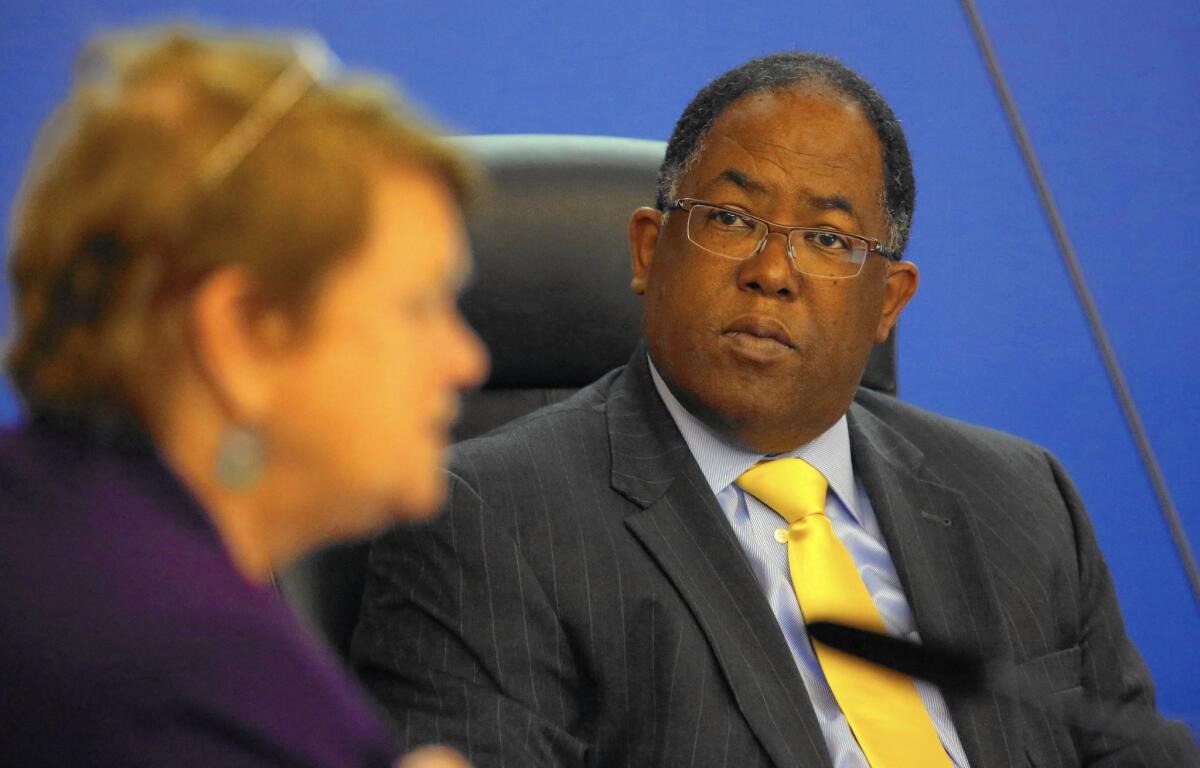L.A. County supervisors move to consolidate power by weakening CEO’s job

A feud between Supervisor Mark Ridley-Thomas, pictured, and former CEO William T Fujioka helped spur a return to a weaker CEO.
They are called the “five little kings.”
Each represents a constituency of about 2 million people. Together, they oversee America’s largest local government agency, with a $27-billion budget and 100,000 employees.
On Tuesday, the Los Angeles County Board of Supervisors decided to grant themselves even more power over the working of the vast bureaucracy.
The board unanimously approved a plan that would weaken the role of the county’s chief executive officer and give the five board members the authority to hire and fire department heads and work more directly within county government’s myriad agencies.
The shift comes after years of clashes between some supervisors and the chief executive officer, and after the election last year of two new board members — Hilda Solis and Sheila Kuehl — who have already taken an active role in key policy issues.
The change back to a weaker executive has many wondering whether the supervisors’ new power will result in more streamlined, decisive management or simply create more meddling by the elected officials and politicize the workings of government.
“In the short term, there will be a lot less conflict between the supervisors and the CEO’s office,” said Raphael Sonenshein, executive director of the Pat Brown Institute for Public Affairs at Cal State L.A. “The question is what’s it going to do for the daily operations… They won’t know when they’re too involved. They’ll think their involvement is just right. The other shoe to drop is how will it affect everybody else’s ability to do their job?”
Tuesday’s vote represents a reversal for the Board of Supervisors, which in 2007 gave the unelected chief executive officer more powers, including day-to-day management responsibilities and the authority to hire and fire department heads with board approval. Those changes were sparked in part by complaints that the supervisors were micromanaging the departments and giving conflicting marching orders, and that there was no single leader to hold accountable for the success or failure of initiatives.
The results have been mixed. An assessment by a county advisory commission in 2008 found that the stronger chief executive officer structure had increased collaboration between departments, but had also slowed down work in some cases by adding another layer of bureaucracy. The commission found that it also had increased tensions between the supervisors and the top administrator. Three years later, the board took back control of the probation department and Department of Children and Family Services, criticizing the chief executive officer’s handling of the agencies after a series of scandals.
Former Supervisors Zev Yaroslavsky and Gloria Molina, who had supported the stronger chief executive officer, said weakening the role now may be largely symbolic, because the board never fully gave up its hands-on role in agency operations.
“Everybody meddled. We all meddled, one way or the other,” Molina said.
Yaroslavsky agreed that board members had continued to micromanage — even going as far as having their aides ghostwrite recommendations that were supposed to be coming from department heads. He added that some initiatives were stalled because of power struggles between supervisors and the chief executive.
Yaroslavsky is now advocating for an elected county executive, a proposal that has not found support among the current board members.
“Outside of the former Soviet Union, Los Angeles County is the only … 10-million-resident government that ever ran by committee of five,” he said.
The board’s move for more power comes as it prepares to tackle a series of hot-button issues, including proposals to raise the county minimum wage, downsize plans for a new Men’s Central Jail and merge three county health departments into one larger agency. The supervisors will also have to decide who will fill the pared-back chief executive role in the long term.
Supervisors Mark Ridley-Thomas and Michael D. Antonovich proposed a return to the weaker chief executive officer last year, but were not able to find a third vote. The new board revived the question earlier this year and asked interim Chief Executive Sachi Hamai to develop a proposed new structure.
Along with returning direct authority over most departments to the board, the new system will formalize other changes that have already been made under the new board, such as eliminating five deputy chief executive officer positions.
In part, the drive to return to a weaker chief executive officer model stemmed from a bitter feud between Ridley-Thomas and former Chief Executive Officer William T Fujioka.
Fujioka declined to comment on the restructuring. Ridley-Thomas said the new system will allow the county to “maximize the efficiencies and the accountability for the delivering of services” to county residents.
“The structural change is very, very important,” he said. “Not all of this is related to personalities. It has to do with systems that are less convoluted and more clear … in how they operate.”
Upon Fujioka’s retirement in November and the election of two new supervisors, the new board majority began dismantling the former chief executive’s power base, reassigning former deputies and removing his former chief deputy from the interim chief executive position.
Antonovich — who opposed the move to a stronger chief executive officer in 2007 — pointed to $2 million in anticipated savings from eliminating the deputy chief executive positions and said the new structure will return accountability to the elected officials.
“The board is responsible, and we need to hold department heads accountable and not have an additional layer of bureaucracy,” he said.
More to Read
Start your day right
Sign up for Essential California for news, features and recommendations from the L.A. Times and beyond in your inbox six days a week.
You may occasionally receive promotional content from the Los Angeles Times.







